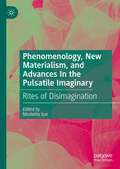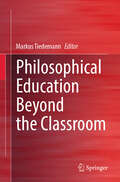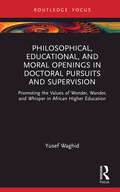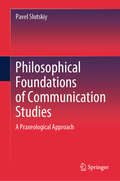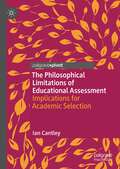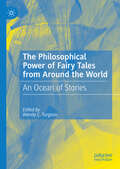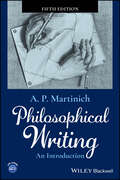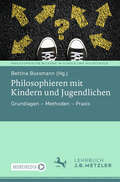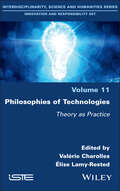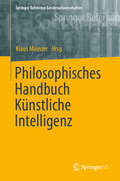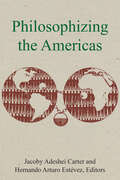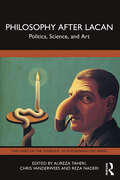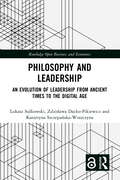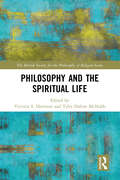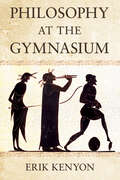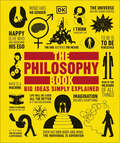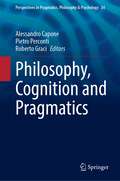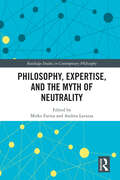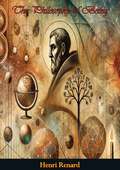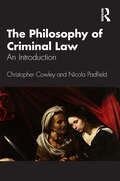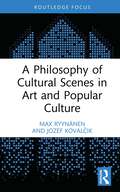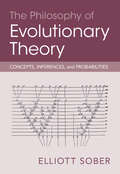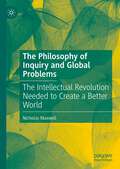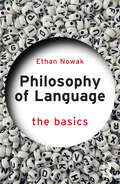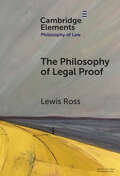- Table View
- List View
Phenomenology, New Materialism, and Advances In the Pulsatile Imaginary: Rites of Disimagination
by Nicoletta IsarPhenomenology, New Materialism, and Advances In the Pulsatile Imaginary: Rites Of Disimagination brings together scholars from art history and image theory, literary studies and philosophy. Chapters of this volume engage with the overarching theme of imagination as a pulsatile force embedded in words, images, and all imaginative modes of instantiation of the work of art in their elemental aspects, expressed in visual arts, and literature, as well as bodily schemata of choreographic and musical performances. The papers employ contrasting and complementing methods from literary studies and image theory, especially phenomenology and new materialism, such as G. Bachelard and M. Merleau-Ponty, G. Bataille, J. Kristeva, P. Lacoue-Labarthe and J. Sallis, G. Didi-Huberman, H. Belting and A. Warburg, J. Bennett and Jason M. Wirth, as well as performance studies. Chapters in this volume inquire into the imaginative forces that disrupt and disinhibit the traditional habits ofimagination to create pulsatile imaginaries, i.e., a dynamic process of “emergence-resurgence” of image manifested in the act of creation and in perception. This process does not properly imply a destruction of image, but rather a withdrawal of image from the realm of representation to give way to new images and new imaginative experiences. The newly coined term “rite of disimagination” points out to this operation, consecutively implying imagining and disimaging that both denies, as well as validates image – it valorizes matter. The affirmation of the materiality of image is “the re-incarnation of image.”
Philosophical Education Beyond the Classroom
by Markus TiedemannDidactics of philosophy and ethics demands problem based orientation and relevance for real life experiences. However, excursions, extracurricular places of learning or 'outdoor education' have hardly been taken into account. A systematic exploration of possible cooperations, synergy effects or incompatibilities has not yet been carried out. The present volume attempts to close this gap and to create an initial basis for further research, testing and discussion. It is intended to make a contribution to teacher training at universities and study seminars as well as to exploratory research in subject didactics.
Philosophical, Educational, and Moral Openings in Doctoral Pursuits and Supervision: Promoting the Values of Wonder, Wander, and Whisper in African Higher Education (Routledge Research in Higher Education)
by Yusef WaghidThis timely volume conceptualises and applies the philosophical notions of wonder, wander, and whisper, serving as evaluative paradigms for objective assessment of quality doctoral research work and supervision in South African higher education. Written by one of the foremost academics in the field, the book combines the normative philosophical, educational, and moral notions of wonder, wander, and whisper with academic life and studies, focusing on doctoral work and supervision not just as cognitive or scientific processes, but also as existential, ethical, and political shaping of the self. By reflecting on three decades of doctoral supervision, the author gives an account of how his students have been initiated into moral discourses of democratic citizenship education and the intellectual adventures they have embarked upon through scholarly texts. The book also presents itself as a decolonial venture that repositions and resituates doctoral education in resistance to the hegemony of colonisation, inhumanity, inequality, unfreedom, and injustice in Southern Africa. Ultimately arguing for the relevance of wonder, wander, and whisper in academic culture, the book will appeal to scholars, researchers, and postgraduates in the fields of higher education, philosophy of education, and sociology of education as well as African education and doctoral studies more broadly.
Philosophical Foundations of Communication Studies: A Praxeological Approach
by Pavel SlutskiyThis book explores the philosophical foundations of communication studies, suggesting that communication phenomena extend beyond the scope of traditional scientific methods. It argues that communication, deeply intertwined with human behavior, cannot be fully comprehended through empirical methods alone. The book presents an epistemological alternative to empiricism in communication studies—an alternative rooted in the praxeological perspective. Drawing from the principles of rationalism, it proposes that conclusions about communication can be deduced from a priori theoretical truths, rather than empirical evidence. This book is a crucial resource for scholars in both philosophy and communication studies.
The Philosophical Limitations of Educational Assessment: Implications for Academic Selection
by Ian CantleyThis book uses philosophical analysis to argue that there are tensions associated with using results of high stakes tests to predict students’ future potential. The implications of these issues for the interpretation of test scores in general are then elucidated before their connotations for academic selection are considered. After a brief overview of the history of academic selection in the United Kingdom, and a review of evidence pertaining to its consequences, it is argued that the practice of using the results of contemporary high stakes tests to make important decisions about students incurs logical and moral problems that a conscientious educator cannot ignore. The gravity of the moral transgression depends on the purpose and significance of the test and, in the case of high stakes tests used for academic selection purposes, it is argued that, not only can the moral wrong be highly significant, but better solutions are within reach.
The Philosophical Power of Fairy Tales from Around the World: An Ocean of Stories
by Wendy C. TurgeonThis book analyzes the philosophical dimensions of fairy tales from cultures all around the world. Though there is a robust literature that analyzes fairy tales from sociological and historical perspectives and psychology has also focused on mining these stories for insights, this book is unique in its focus on fairy tales as philosophical texts. Bringing together scholars from a truly global range of philosophical and literary traditions, this book shows that fairy tales encapsulate the human dilemma of living in the world, trying to make meaning, and charting a course through good and evil. The book's contributors study fairy tales from East Africa, Australia, Jewish Eastern Europe, Iran, Korea, Turkey, Indigenous North America, and beyond. Ending with a section on Philosophy for Children, this book will also be of interest to scholars and practitioners in this subfield, in addition to scholars of philosophy and popular culture and philosophy of literature.
Philosophical Writing: An Introduction
by A. P. MartinichPhilosophical Writing helps students to think clearly and analytically, improve their essay-writing skills, and present their knowledge and thoughts in a precise and coherent manner. Acclaimed for its accessible, highly practical approach, this bestselling textbook emphasizes what students should do in crafting a philosophical essay, as well as other types of essays that analyze concepts across a variety of disciplines. Tracing the evolution of a good philosophical essay from the draft stage to completion, the book's eleven chapters are purpose-built to serve the needs of a wide range of students, with levels ranging from elementary to moderately advanced. Philosophical Writing includes numerous essay examples, techniques for outlining and composing, guidance on evaluating philosophical essays, useful appendices, a glossary, a full-featured companion website, and more. Now in its fifth edition, Philosophical Writing is fully updated with enhanced language and improved explanations throughout. Two entirely new chapters delve into the intricacies of belief networks and explore the properties of sound interpretations, supported by a wealth of new exercises and discussion questions. Written with clarity and humor by a leading analytic philosopher, Philosophical Writing: Helps students organize their beliefs, assess their interpretations, and critically evaluate the ideas of others Explains the basic concepts of logic and rhetoric, the structure of a philosophical essay, and the criterion of good philosophical writing Describes key tactics for analytic writing, such as definitions, analysis, counterexamples, and dialectical reasoning Discusses the concepts of author and audience as they apply to a student's philosophical writing Offers advice on common problems that students encounter when writing a philosophical essay Philosophical Writing: An Introduction, Fifth Edition, remains an ideal textbook for lower- and upper-division courses in philosophy, particularly introductory philosophy classes, as well as courses with significant writing components that cover logic, rhetoric, and analysis.
Philosophieren mit Kindern und Jugendlichen: Grundlagen – Methoden – Praxis (Philosophische Bildung in Schule und Hochschule)
by Bettina BussmannKinder und Jugendliche sind Meister im Staunen. Sie sind neugierig, machen sich Gedanken und stellen unermüdlich Fragen. Dieser Wunsch, Neues zu entdecken und die Fähigkeit, zu staunen, können Ausgangspunkte für philosophische Fragestellungen sein. Wenn Kinder philosophieren, können sie ihre Meinung begründet äußern, das Für und Wider bestimmter Probleme abwägen, Gedankenexperimente durchführen und so über sich selbst hinauswachsen. Kinder brauchen allerdings spezielle Zugänge zur Welt der Philosophie, um das Philosophieren zu lernen, und Gesprächsleiter*innen benötigen dafür entsprechendes philosophisches Wissen, methodische Werkzeuge und ansprechende Materialien. „Philosophieren mit Kindern und Jugendlichen“ ist ein sowohl praxisorientiertes als auch fachphilosophisch fundiertes Lehrbuch. Die Unterrichtsmodule sind für Kinder der Grundschule und der Sekundarstufe 1 konzipiert, vieles eignet sich auch für die Arbeit mit älteren Schüler*innen und Erwachsenen. Alle Einheiten sollen angehenden und praktizierenden Lehrkräften anhand der eingesetzten Materialien vermitteln, was das spezifisch Philosophische der jeweiligen Thematik ist, welche Methoden besonders geeignet sind, welche Probleme auftreten können und worauf man bei der Planung achten muss.
Philosophies of Technologies: Theory as Practice
by Valérie Charolles Élise Lamy-RestedIn the space of a century, technologies have acquired unprecedented power. The result of these developments is a new form of the world. These transformations test our capacities and generate new crises with multiple issues at stake. Drawing on the lessons of a long history, Philosophies of Technologies examines the continuities and disruptions brought about by the power of contemporary technical systems, without reducing them to the digital age. It draws together 13 authors from different schools of thought and proposes tools that combine productive technology with sustainability, innovation and responsibility. This book wagers that, in the face of the sprawling and ever-changing deployment of technologies, philosophy is able to respond to the changes that offer so many opportunities to shape our future. Today, technologies need a philosophical moment.
Philosophisches Handbuch Künstliche Intelligenz
by Klaus MainzerDas Handbuch schlägt die Brücke von der Grundlagenforschung zum Orientierungswissen. Es greift damit die Bildungs- und Ausbildungsziele der bundesweiten MINT-Initiative auf, die Mathematik (M), Informatik (I), Naturwissenschaft (N) und Technik (T) als fachübergreifendes Schlüsselwissen für technisch-wissenschaftlich gestützte Gesellschaften versteht. Additives Wissen und Ausbildung in getrennten Disziplinen der Mathematik, Informatik, Naturwissenschaft und Technik reichen aber nicht aus. In der Künstlichen Intelligenz wachsen diese Disziplinen mit den Human- und Sozialwissenschaften zusammen. Zunächst sollen die Grundlagen der KI-Forschung methodisch und begrifflich geklärt werden. Philosophie wird als Grundlagenforschung verstanden, die logisch und methodisch die Prinzipien von Wissenschaft und Technik untersucht. Daher handelt es sich um ein „Philosophisches Handbuch“ (in diesem Fall der KI) und nicht um eine Bindestrich-Philosophie, also ein Handbuch der Philosophie einer Einzelwissenschaft. Denken und Wissen selber und das Selbstverständnis der Menschen verändern sich durch KI grundlegend.
Philosophizing the Americas
by Stephanie Rivera Berruz Jacoby Adeshei Carter Nadia Celis Tommy J. Curry Hernando Arturo Estévez Daniel Fryer James B. Haile III Chike Jeffers Lee A. McBride III Michael J. Monahan Adriana Novoa Susana Nuccetelli Andrea Pitts Dwayne A. Tunstall Alejandro VallegaPhilosophizing the Americas establishes the field of inter-American philosophy. Bringing together contributors who work in Africana Philosophy, Afro-Caribbean philosophy, Latin American philosophy, Afro-Latin philosophy, decolonial theory, and African American philosophy, the volume examines the full range of traditions that have, separately and in conversation with each other, worked through how philosophy in both establishes itself in the Americas and engages with the world from which it emerges.The book traces a range of questions, from the history of philosophy in the Americas to philosophical questions of race, feminism, racial eliminativism, creolization, epistemology, coloniality, aesthetics, and literature. The essays place an impressive range of philosophical traditions and figures into dialogue with one another: some familiar, such as José Martí, Sylvia Wynter, Martin R. Delany, José Vasconcelos, Alain Locke, as well as such less familiar thinkers as Arturo Alfonso Schomburg, Hilda Hilst, and George Lamming. In each chapter, the contributors find fascinating and productive matrices of tension or convergence in works throughout the Americas. The result is an original and important contribution to knowledge that introduces readers from various disciplines to unfamiliar yet compelling ideas and considers familiar texts from novel and prescient perspectives. Philosophizing the Americas stands alone as a representation of current scholarly debates in the field of inter-American philosophy.
Philosophy After Lacan: Politics, Science, and Art (The Lines of the Symbolic in Psychoanalysis Series)
by Alireza Taheri Chris Vanderwees Reza NaderiPhilosophy After Lacan: Politics, Science, and Art brings together reflections on contemporary philosophy inspired by and in dialogue with Lacanian theory.Rather than focus on the thinkers who came before Lacan, the editors maintain attention on innovations in contemporary philosophy that owe their emergence to complimentary, critical, direct, or tangential engagement with Lacan. This collection makes one of the first concerted efforts to expand discussions between psychoanalysis and more recent philosophical thinkers while gathering chapters by some of the leading philosophical voices of the present moment. With contributors from around the world, this book has international appeal and is unique in its emphasis on contemporary philosophies inspired or influenced by Lacan.Philosophy After Lacan will not only appeal to psychotherapists and psychoanalysts, but also to students and professors of philosophy, critical theory, psychology, politics, history, and literature.
Philosophy and Leadership: An Evolution of Leadership from Ancient Times to the Digital Age (Routledge Open Business and Economics)
by Łukasz Sułkowski Zdzisława Dacko-Pikiewicz Katarzyna Szczepańska-WoszczynaPhilosophy and Leadership is an ambitious exploration of leadership's philosophical underpinnings from antiquity to the AI-driven future. The book journeys through history, gleaning insights from eminent philosophers and contextualizing their teachings to leadership.The book's foundational premise lies in the symbiosis of philosophy and leadership. Philosophy provides the "why" that drives the practices and decisions in leadership. This intricate connection is unfolded from the teachings of Confucius on virtue and ethics to the contemporary dialogues of Judith Butler on leadership identity. The book also delves into the evolution of leadership concepts through various eras—medieval times highlighting religious and scholastic perspectives, the Renaissance juxtaposing Machiavellian pragmatism with More's utopian ideals, and the Enlightenment era underscoring the importance of duty, skepticism, and rationality. An exciting aspect of the narrative is the amalgamation of evolution and leadership. By drawing parallels between Darwin's natural selection and leadership dynamics or Bergson's vitalism and intuitive leadership, the authors present a merger of biological evolution with leadership's ever-evolving paradigms. Finally, the concluding chapters reside in envisioning the future and reflect upon the impending synergy between AI and leadership. They emphasize the importance of amalgamating philosophical wisdom with the promises and challenges brought about by AI.The book will guide readers from the philosophical epochs of yore to the AI-predicted leadership paradigms of the future. By intertwining the enduring wisdom of philosophers with the dynamic nature of leadership, this book serves as a beacon for anyone aspiring to lead in any era.
Philosophy and the Spiritual Life (The British Society for the Philosophy of Religion Series)
by Victoria S. Harrison Tyler Dalton McNabbThis book breaks new ground for the philosophy of religion by showcasing work that engages with the lived reality of the spiritual life. It demonstrates that philosophy’s relationship with spirituality is more than a historical curiosity and that, in the twenty-first century, it is still meaningful to think about philosophy in connection with spirituality. The chapters are organised around the following themes: spiritual practice and philosophical understanding; philosophical reflections on living a spiritual life; philosophical problems concerning the spiritual life. The first part discusses whether or not the topic of spirituality should be given a more fundamental role within the philosophy of religion, and, if so, how that might be accomplished. The second part addresses fundamental issues concerning human beings, their lives, and their self-understanding in relation to the spiritual life. The final part considers philosophical problems that emerge when discussing the spiritual life. By bringing together discussions of these topics, this volume constitutes a valuable resource for scholars in disciplines in which the spiritual life is a focus of interest, particularly philosophy, theology, and religious studies.
Philosophy at the Gymnasium
by Erik KenyonPhilosophy at the Gymnasium returns Greek moral philosophy to its original context—the gyms of Athens—to understand how training for the body sparked training for the mind. The result is an engaging inroad to Greek thought that wrestles with big questions about life, happiness, and education, while providing fresh perspectives on standing scholarly debates.In Philosophy at the Gymnasium, Erik Kenyon reveals the egalitarian spirit of the ancient gym, in which clothes—and with them, social markers—are shed at the door, leaving individuals to compete based on their physical and intellectual merits alone. The work opens with Socratic dialogues set in gyms that call for reform in character education. It explores Plato's moral and political philosophy through the lens of mental and civic health. And it holds up Olympic victors as Aristotle's model for the life of happiness through training.
The Philosophy Book (DK Big Ideas)
by DKGet to grips with the concepts that shaped the way we think about ethics, politics, and our place in the universe.Explaining the big ideas and groundbreaking theories of key philosophers clearly and simply, The Philosophy Book is the perfect one-stop guide to philosophy and the history of how we think. Untangling knotty theories and shedding light on abstract concepts, entries explore and explain each complex idea with easy-to-follow explanations and innovative visuals. Explore the history of philosophy, from ancient Greece and China to today, and find out how theories from over 2,000 years ago are still relevant to our modern lives. Follow the progression of human ideas and meet the world's most influential philosophers – from Plato and Confucius through René Descartes and Mary Wollstonecraft to Ludwig Wittgenstein and Judith Butler.Dive into this phenomenal philosophy book to discover:-An accessible guide to philosophy, covering every major school and movement throughout history.-The clear and detailed text explains the most groundbreaking philosophical concepts and theories ever devised, while bold illustrations and pull-out quotes bring each idea to life.-Fully revised and updated to cover any developments in the field over the last 5–10 years.-Biography and context boxes place each idea in its wider historical, cultural, and social context.Your Philosophical Questions, Simply ExplainedIf you thought it was difficult to learn philosophy and its many concepts, The Philosophy Book presents the key ideas in a clear layout. Find out what philosophers thought about the nature of reality and the fundamental questions we ask ourselves: What is the meaning of life? What is the Universe made of? And work your way through the different branches of philosophy, such as metaphysics and ethics, from ancient and modern thinkers.The Big Ideas SeriesWith millions of copies sold worldwide, The Philosophy Book is part of the award-winning Big Ideas series from DK. The series uses striking visuals and engaging writing, making big topics easy to understand.
Philosophy, Cognition and Pragmatics (Perspectives in Pragmatics, Philosophy & Psychology #34)
by Alessandro Capone Pietro Perconti Roberto GraciThis book contains essential contributions to enrich and broaden the application field of pragmatics. It provides an example of how the fruitful reflections and refined conceptual distinctions born in the philosophical field can find a practical application in addressing social, cognitive, clinical, and psychological problems. Its chapters address, from different points of view, the relationship between pragmatic linguistics and philosophy, and outline the possible application of pragmatic theories to different domains. Developed during the third Pragmasophia international conference, whose name is derived from the Greek terms πρᾶγμα (action, fact) and σοϕία (knowledge, science), the book aligns itself with its aim to study human actions and activities and how they take shape through language. But ‘Pragma’ and ‘Sophia’ also signal another purpose: highlighting the importance of creating links between empirical investigations on language use, and more traditional philosophical approaches. In this reading, ‘Pragma’ represents the experimental goal devoted to analysing and interpreting language facts. In contrast, the term ‘Sophia’ recalls the original vocation of past philosophers to pursue an ideal of ‘pure knowledge’, disconnected from any practical-economic interest. While maintaining the conference's original purpose of encouraging productive comparisons between different approaches, the book consists of two sections: first, on philosophical approaches, recalls more theoretical aspects (closer to the term ‘Sophia’); the second, ‘Inferential and Cognitive Pragmatics,’ addresses more practical issues affecting domains such as Greek literature, pragmatic disorders, dictionary entries, and speech analysis. The reader, whether in linguists, philosophy or psychology, obtains a complete overview of the most advanced current research lines, both theoretical and empirical, and thus contributes to broadening the scope of pragmatics.
Philosophy, Expertise, and the Myth of Neutrality (Routledge Studies in Contemporary Philosophy)
by Mirko Farina Andrea LavazzaThis volume offers a new framework for understanding expertise. It proposes a reconceptualization of the traditional notion of expertise and calls for the development of a new contextual and action-oriented notion of expertise, which is attentive to axiological values, intellectual virtues, and moral qualities.Experts are usually called upon, especially during times of emergency, either as decision-makers or as advisors in formulating policies that often have a significant impact on society. And yet, for certain types of choices, there is a growing tension between experts’ recommendations and alternative views. The chapters in this volume critically assess the idea of whether possessing epistemic authority can automatically make someone’s assertions necessarily more grounded than others. They not only evaluate the epistemological implications of this idea but also reflect on its ethical, socio-cultural, and political consequences. The interdisciplinary framework advanced across the chapters seeks to overcome certain limitations that underlie current models of expertise by adopting more inclusive and representative decisions that can improve the perceived neutrality of experts’ decisions. Increasing neutrality means reducing cases in which an unidentified bias – be it a scientific one or not – puts any of the individuals involved in a specific public choice at a systematic disadvantage.Philosophy, Expertise, and the Myth of Neutrality will appeal to scholars and advanced students working in epistemology, philosophy of science, philosophy of the social sciences, public policy, and sociology.
The Philosophy of Being
by Henri RenardDelve into the profound depths of metaphysics with Henri Renard's The Philosophy of Being. This insightful work offers a comprehensive exploration of the fundamental principles of being, presenting readers with a thorough understanding of classical metaphysical thought and its enduring relevance to contemporary philosophical inquiry.Henri Renard, S.J., a distinguished philosopher and Jesuit scholar, masterfully guides readers through the complexities of metaphysics, focusing on the nature of existence and the essence of reality. The Philosophy of Being is rooted in the rich tradition of Thomistic philosophy, drawing extensively on the works of St. Thomas Aquinas and other great thinkers of the Scholastic tradition.The book covers key metaphysical concepts such as substance, essence, existence, causality, and the nature of God. Renard's clear and systematic approach makes these abstract ideas accessible, providing readers with a solid foundation in metaphysical principles. He carefully examines the interplay between potentiality and actuality, the hierarchy of being, and the relationship between essence and existence, offering a cohesive and comprehensive overview of metaphysical thought. His rigorous analysis and thoughtful reflections make this book an invaluable resource for students of philosophy, theologians, and anyone interested in the foundational questions of metaphysics.The Philosophy of Being is not only an academic treatise but also a profound meditation on the nature of reality and our place within it. Join Henri Renard on a journey through the timeless questions of metaphysics and discover the philosophical principles that lie at the heart of the nature of being. The Philosophy of Being is a timeless exploration of existence that continues to inspire and challenge readers to contemplate the mysteries of reality.
The Philosophy of Criminal Law: An Introduction
by Christopher Cowley Nicola PadfieldThe Philosophy of Criminal Law: An Introduction explores the central concepts of criminal law, such as intention, complicity and duress, and how they work, both within criminal law practice and in our everyday lives, from legal and philosophical perspectives. At the heart of the book is the central philosophical concept of responsibility: what does it mean to be responsible for an act, to hold someone responsible for an act, or to give an excuse in order to avoid responsibility for an act? Offering talking points to enrich an ongoing conversation, this unique textbook addresses all of these questions in an accessible way for law and non-law students alike. Real cases are examined in detail and a critical approach to the criminal law is adopted throughout. The focus will be mainly on the criminal law of England and Wales, with occasional cases from other jurisdictions, and occasional examples from other areas of law. This text will be ideal reading for advanced undergraduate and graduate students of law, philosophy and criminology, as well as political science and sociology.
A Philosophy of Cultural Scenes in Art and Popular Culture (Routledge Focus on Art History and Visual Studies)
by Max Ryynänen Jozef KovalčikThis book seeks to understand culture through the lens of scenes, analyzing them aesthetically and culturally as well as understanding them through the frameworks of gender, social networks, and artworlds. It is common to talk about the cultural and intellectual scenes of early twentieth-century Vienna, the visual art scene of postwar New York, and the music and fashion scene of the swinging London. We often think about artists and works of art as essentially belonging to a certain scene. Scenes might offer a new approach to study what is possible, what is a tradition, and/or to discuss what are the relevant units of contemporary culture for research. The book posits that scenes explain a lot about how the artworld and the cultural field function. Vivienne Westwood, Rene Magritte, Roman Jakobson, Arthur C. Danto, Susan Sontag, James Baldwin, and Didier Eribon are among the figures included in the book, which examines scenes in cities such as Moscow, Bombay, New York, London, Paris, Brussels, Helsinki, and Bratislava. The book will be of interest to scholars working in art history, cultural studies, philosophy, film, literature, and urban studies.
The Philosophy of Evolutionary Theory: Concepts, Inferences, and Probabilities
by null Elliott SoberNatural selection, mutation, and adaptation are well-known and central topics in Darwin's theory of evolution and in the 20th - and 21st -century theories which grew out of it, but many other important topics are used in evolutionary biology that raise interesting philosophical questions. In this book, Elliott Sober analyses a much larger range of topics, including fitness, altruism, common ancestry, chance, taxonomy, phylogenetic inference, operationalism, reductionism, conventionalism, null hypotheses and default reasoning, instrumentalism versus realism, hypothetico-deductivism, essentialism, falsifiability, the principle of parsimony, the principle of the common cause, causality, determinism versus indeterminism, sensitivity to initial conditions, and the knowability of the past. Sober's clear philosophical analyses of these key concepts, arguments, and methods of inference will be valuable for all readers who want to understand evolutionary biology in both its Darwinian and its contemporary forms.
The Philosophy of Inquiry and Global Problems: The Intellectual Revolution Needed to Create a Better World
by Nicholas MaxwellUniversities have long been dominated by a philosophy of inquiry that may be called knowledge-inquiry. This holds that, in order to do justice to the basic humanitarian aim of helping to promote human welfare, academic inquiry must, in the first instance, seek knowledge and technological know-how. First, knowledge is to be acquired; once acquired, it can be applied to help promote human welfare. But this philosophy of knowledge-inquiry is an intellectual and humanitarian disaster. It violates three of the four most elementary rules of rational problem solving conceivable, and as a result fails to give priority to the task of helping humanity resolve those conflicts and problems of living, such as the climate and nature crises, that need to be resolved if we are to make progress to a better world – a world in which there is peace, democracy, justice, liberty, and sustainable prosperity, for all. Very few academics today are aware of this rationality scandal. We urgently need to bring about a revolution in universities around the world, wherever possible, so that academic inquiry puts all four rules of rational problem solving into practice, and becomes rationally devoted to helping humanity learn how to make progress towards a better world. Knowledge-inquiry needs to become wisdom-inquiry, rationally devoted to helping humanity create a wiser world.
Philosophy of Language: The Basics (The Basics)
by Ethan NowakThis book provides beginners with a sense of the questions and methods that make up the philosophy of language. The first four chapters develop the idea that language is a system that allows us to exchange information with each other, and the second four chapters explore the idea that language is a tool we can use to perform actions, like promising, insulting, and socially positioning ourselves.The first part of the book traces an arc connecting questions like: What is language? Where does meaning come from? How do we use meanings to send messages to each other? The second part of the book takes up questions like: Does pornography silence women? What is offensive about slurs? What do we lose when languages go extinct? With a glossary of key terms, questions for reflection, and suggestions for further reading, Philosophy of Language: The Basics is the place to start for anyone who is curious about how high the seas of language rise.
The Philosophy of Legal Proof (Elements in Philosophy of Law)
by null Lewis RossCriminal courts make decisions that can remove the liberty and even life of those accused. Civil trials can cause the bankruptcy of companies employing thousands of people, asylum seekers being deported, or children being placed into state care. Selecting the right standards when deciding legal cases is of utmost importance in giving those affected a fair deal. This Element is an introduction to the philosophy of legal proof. It is organised around five questions. First, it introduces the standards of proof and considers what justifies them. Second, it discusses whether we should use different standards in different cases. Third, it asks whether trials should end only in binary outcomes or use more fine-grained or precise verdicts. Fourth, it considers whether proof is simply about probability, concentrating on the famous 'Proof Paradox'. Finally, it examines who should be trusted with deciding trials, focusing on the jury system.
